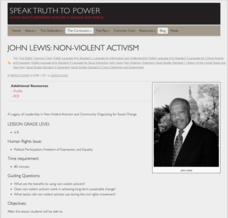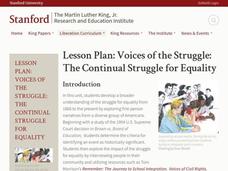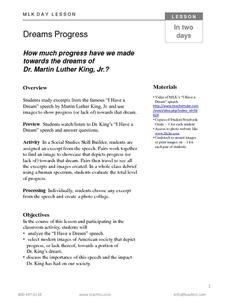Stanford University
Civil Rights or Human Rights?
Young citizens consider the American civil rights movement as part of the global struggle for human rights. After using a timeline activity to learn about the major events in the civil rights movement, class members study Malcolm X's...
BrainPOP
Civil Rights Lesson Plan: Tracking History Through Timelines
Use the accompanying assessment to determine your class's prior knowledge on Martin Luther King, Jr. before beginning a lesson plan on the famous civil rights movement leader. The resource has young historians thinking about life for...
National Endowment for the Humanities
Martin Luther King, Jr. and Nonviolent Resistance
Was nonviolent resistance the best means of securing civil rights for black Americans in the 1960s? For this highly engaging and informative lesson, your young historians will closely analyze several key documents from the civil rights...
Curated OER
Martin Luther King, Jr.
Fifth graders research the highlights of Martin Luther King Jr's life. They gain an understanding of the Jim Crow Laws and The Civil Rights Movement, as well as becoming familiar with Dr. King's "I Have A Dream" speech. Groups of...
Newseum
'The Press and the Civil Rights Movement' Video Lesson
Scholars watch a video featuring journalists who covered the civil rights movement, then respond to questions on a viewing guide. The video features interviews with participants and original news footage from the 1950s and 1960s. In...
Mr. Beem's Social Studies
Civil Rights Project: The Long Civil Rights Movement
Investigate milestones along the path that lead to the American Civil Rights Movement of the 1960s. After researching key people, events, court cases, and legislative orders, teams present their findings as a magazine, newspaper, or...
Anti-Defamation League
Martin Luther King, Jr. and Civil Rights
How far have we come and how far do we still need to go to achieve equality and full civil rights in the United States? Include a packet of materials collected in your observance of Martin Luther King, Jr. Day.
K12 Reader
Civil Rights Biography: Dr. Martin Luther King, Jr.
Why do schools and government offices close one day every January to honor the birthday of Dr. Martin Luther King, Jr.? Young learners discover the achievements and lasting significance of this influential figure in American history with...
Curated OER
Human Rights And Civil Rights
While he may not be as well known as civil rights activists such as Mahatma Gandhi, Dr. Martin Luther King, or Malcolm X, Ralph Bunche's contributions certainly made him a leader in the struggle for civil rights in the United States and...
PBS
Martin Luther King Jr.: Civil Rights Leader
Expand class members' appreciation of the work of Dr. Martin Luther King, Jr. A powerful resource examines King's speeches, writings, and actions that reveal his deep commitment to a nonviolent approach to Civil Rights. Learners watch a...
PBS
Malcolm X: Minister and Civil Rights Activist
Any study of the leaders of the Civil Rights Movement would be incomplete without an examination of the life of Malcolm X. Class members view a short biographical video and analyze primary source documents to gain an understanding of the...
Speak Truth to Power
John Lewis: Non-Violent Activism
After comparing and contrasting non-violent and violent social movements, your young historians will take a closer look at the work and influence of John Lewis on the civil rights movement. They will then choose a current social justice...
C-SPAN
Last Days of Martin Luther King, Jr.
On April 4, 1968, Dr. Martin Luther King, Jr. was assassinated in Memphis, Tennessee. Four video clips reveal the events of that time, including the shift in the focus of the Civil Rights Movement, the aftermath of the assassination, and...
Curated OER
Ethos, Logos, and Pathos in Civil Rights Movement Speeches
Examine three speeches while teaching Aristotle's appeals. Over the course of three days, class members fill out a graphic organizer about ethos, pathos, and logos, complete an anticipatory guide, read speeches by Martin Luther King Jr.,...
Albert Shanker Institute
Heart of the Matter
Most people have heard of Dr. Martin Luther King, Jr. and his famous "I Have a Dream" speech, but few have heard of Philip Randolph and Bayard Rustin. Who were these guys and what did they have to do with this famous landmark event in...
Stanford University
Martin Luther King, Jr. and Malcolm X: A Common Solution?
Much has been made of the differences between Martin Luther King, Jr. and Malcolm X. But was there any common ground between them? Class members reconsider what they think they know about these two civil rights leaders with biographical...
Stanford University
Lesson Plan: The Children's Crusade and the Role of Youth in the African American Freedom Struggle
Young people played significant roles in the Civil Rights movement. Class members examine the contributions of Barbara Johns, Claudette Colvin, Mary Louise Smith, and the children of Birmingham,...
Scholastic
Ruby Bridges: A Simple Act of Courage, Grades K-2
A civil rights movement lesson designed specifically with the Common Core State Standards in mind, young learners are introduced to the story of Ruby Bridges as the first African American child to attend an all-white elementary school....
University of North Carolina
Remembering Martin Luther King, Jr.
After reading the article "Kings Dream Everyday," class members conduct a Socratic seminar discussion of Martin Luther King's contributions to the civil rights movement. They then read and respond to a passage from Michael Eric Dyson's...
Stanford University
Voices of the Struggle: The Continual Struggle for Equality
As part of a study of the Civil Rights Movement from 1868 to the present, class members examine first person narratives, the Supreme Court case Brown v. Board of Education, and other significant events in civil rights history. They then...
Alabama Department of Archives and History
How Would You Feel? The Bravery of Civil Disobedience
As part of their study of the US Civil Rights Movement and the Montgomery bus boycott, class members read Dr. Martin Luther King's "Integrated Bus Suggestions." They then craft a short story about the first week of Montgomery bus...
TCI
Dreams Progress
Has society progressed to the dream Martin Luther King Jr. expressed in his famous address during the civil rights movement? Learners work with a partner to analyze one excerpt from King's "I Have A Dream" speech and find a current image...
Miama-Dade County Public Schools
African Americans and the Civil War
The American Civil War is the theme of this packet of materials prepared for Black History Month. Class members learn about the roles that African Americans played during the Civil War and examine the African-American experience after...
National Endowment for the Humanities
"Sí, se puede!": Chávez, Huerta, and the UFW
"Sí, se puede!" Cesar Chavez and Dolores Huerta believed organizing farm workers and changing their working conditions were possible. Scholars examine provisions of the Bracero Program, videos, and the United Farm Workers' (UFW) work....

























